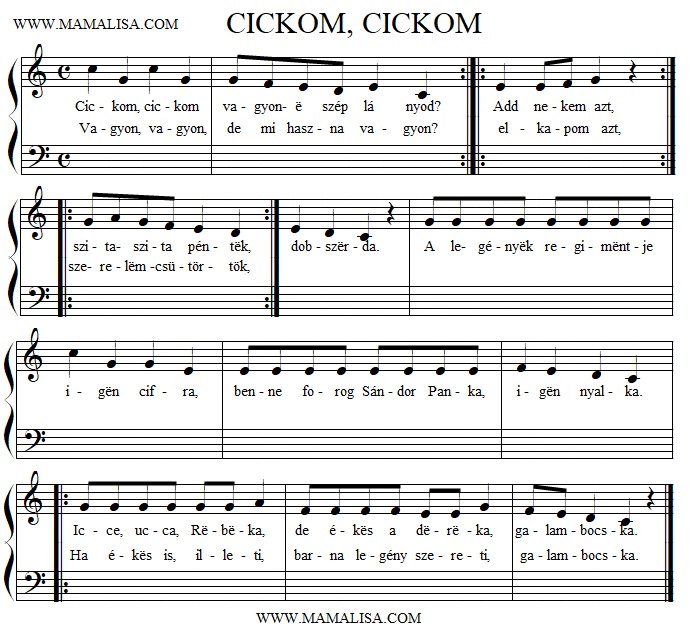Cickom, cickom
"Cickomázás" was a typical dancing game during Lent.
Cickom, cickom
Cickom, Cickom
Circle Dance
Circle Dance
(Hungarian)
(English)
Cickom, cickom, vagyon-e szép lányod?
Vagyon, vagyon, de mi haszna vagyon?
Add nekem azt, elkapom azt,
Szita-szita péntek, szerelem csütörtök,
Dobszerda.
A legények regimentje igen cifra,
Benne forog Sándor Panka, igen nyalka,
Ice-ruca Rebeka, de ékes a dereka,
Galambocska.
Ha ékes is illeti, barna legény szereti,
Galambocska.
Cickom, cickom (1), have you got a nice daughter to sell?
Yes, I have, I have, but what is the use of that?
Give that to me, I'll catch that (2)
Sieve-sieve Friday, Love-Thursday
Drum-Wednesday (3).
The regiment of the bachelors is rather swanky (4)
Panka Sándor is turning (5) in it, she is so hot (6)
Ice-ruca (7) Rebecca, how garnished her waist is
Little pigeon.
Even if it's garnished, she is still moving it (8)
A brown-haired man likes it.
Little pigeon. (9)
Notes
(1) According to Wikipedia in Hungarian, "cickomázás" was a typical dancing game during Lent. Young people would stand in a circle, a girl standing in the middle had to choose her partner on the line, "Give that to me". The word is rather onomatopoeic, too. "Cic-cic" is the way Hungarians call their cats to come to them, like the English phrase, "kitty-kitty".
(2) Instead of an objective pronoun the text uses a demonstrative one. (that = azt)
(3) This is said to have been some kind of an oral enchantment.
(4) Or "adorned" just like in the song Cifra palota (Adorned Palace).
(5) "Turning" or "spinning" could also refer to the dance she is making.
(6) This is an archaic word. "nyalka" means well-dressed, here it refers to a girl who has put her makeup on nicely, nicely-combed her hair, etc…
(7) A nonsense phrase again. "Ice", however, connotes an old Hungarian wine measurement (icce). "Ruca" is an archaic way of saying "duck".
(8) "Illet" - It does not really make any sense for me here. I figured that it also refers to dancing movements of the waist.
(9) Diminutive form of "pigeon".
Comments
This song was collected by Jószef Szabó between 1885 - 1887 in the village of Mátraballa.


Thanks!
Thanks!
Thanks!
Thanks and Acknowledgements
Many thanks to Tinker Jack for contributing this song, for translating it and for the interesting notes about the song.
Köszönöm szépen!


























